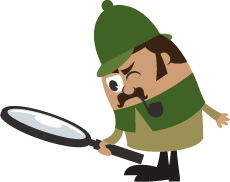Making major purchases online can be daunting. Whatcom County Library System staff can help you avoid scams and shop safely. Stop by any WCLS location for assistance, or check out these handy tips and booklists for further information.
TAKE A QUIZ
Want to test your digital literacy skills? Try one of these quizzes:
DON’T GET SCAMMED – PAY ATTENTION TO THE TIPS BELOW
Buying a Vehicle from an Individual Online
Three things to remember when you buy a car or truck:
- Making major purchases online can be daunting. Whatcom County Library System staff can help you avoid scams and shop safely. Stop by any WCLS location for assistance, or check out these handy tips and booklists for further information.
- Get familiar with common online car-buying scams to avoid.
- Do some online research.
- Evaluate reviews of the seller, but be careful, reviews could be fake.
- Search for seller’s phone number – has it been used for telemarketing?
- Confirm that the make/model/year of vehicle exists.
- Verify the vehicle’s market value using KBB.com – be cautious of extremely low prices.
- Use a free VIN Check website to find out as much about the vehicle as possible.
- Do a reverse image search to make sure you’re looking at photos of the actual vehicle.
- Examine the photo of the seller to make sure it’s a real person, not a deepfake.
- Get Real
- Phone the seller to confirm you’re dealing with a real person.
- Arrange to see the vehicle in-person. Bring a friend or family member along.
- Bring the vehicle for a professional inspection if possible.
- Never give out your social security number or bank account number.
- Pay in cash or at a bank – be wary of escrow services pushed by the seller – select your own, reputable service instead.
- Make sure the seller has a clear title to the vehicle and gives it to you when you pay.
- Take these steps if you are the victim of an online auto scam.
Other Resources:
Online Car-Buying Scams to Watch Out For – Experian
Title fraud | Washington State Department of Licensing
Buying Precautions & Used Car Considerations | Washington State
Sorting Through Skin Care Scams
- Pause to get your emotions in check and think about how to tell if the information is legitimate.
- Be suspicious of exaggerations like “miracle” or “wonder” to describe the product.
- Research the reputation of the scientific journals referenced. Not all scientific journals are as trustworthy or acclaimed as others.
- Use library databases to track down links or citations to the actual scientific studies quoted. Make sure they actually said what the advertisement claims.
- Consider the source of information about the product. TikTok and other social media platforms do not require online sellers to verify their credentials. Sellers are out to make money, and are incentivized to make exaggerated claims to generate more clicks.
- Check to make sure the website is for an actual reputable brand, not a knock-off. Is the website address spelled correctly? Is it a reseller? Luxury brands are especially vulnerable to fraud.
- Be careful about sharing credit card information with unknown sellers or websites. Look for verified payment methods like PayPal, ApplePay and others.
Other resources:
Health Fraud Scams | FDA
MORE RESOURCES
It’s hard to know what to trust in the online environment.
For more digital literacy skills, take a look at these resources.
Got a question? Ask Us! The online space can be tricky to navigate. Our staff are here to help.
Whatcom County Library System offers free access to Consumer Reports Magazine using your library card
Whatcom County Library System partners with The Center for an Informed Public – University of Washington and The National Science Foundation to provide you information you can trust and resources so you can learn more for yourself.




